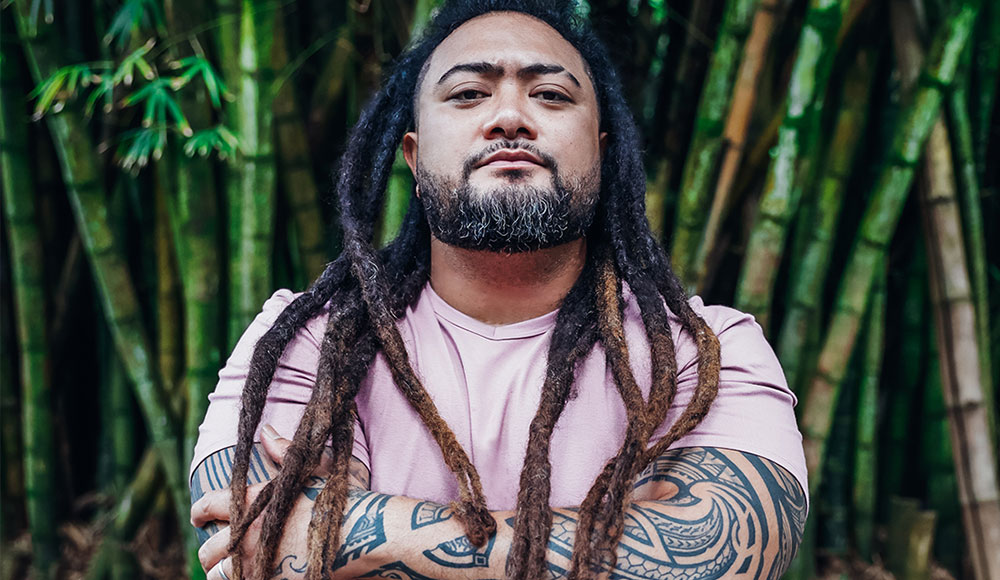LA-born, Hawaii-based, ethnically Polynesian and musically immersed in the sounds of Jamaica, reggae artist J Boog is an international and multicultural sensation. Buoyed by the success of his latest single, “Fire Up Di Roses”—a collaboration with The Green, Common Kings and mentor Fiji—J Boog is in the midst of a world tour that takes him as far as New Zealand. Among those concert dates is a Sept. 22 performance at San Jose’s Music in the Park.
This is Boog’s fourth appearance at Music in the Park, and his 2019, 2021 and 2023 shows set attendance records for the concert series, confirming his strong connection to South Bay communities.
Born Jerry Afemata, J Boog was introduced to reggae at a very young age thanks to an older sister who played him cassette tapes of Bob Marley’s music. At the time, he had no understanding of how the music was made, but it moved him. “I didn’t know it could be replicated,” he explains. “I didn’t know anything about instruments.” But he says that when his sister sat at the family’s piano and started to play Marley’s classic “Jamming,” it was a revelation. “I was in shock,” says Boog. “And that groove was the spark of me getting into the music.”
J Boog’s parents were both born in American Samoa. His family’s Samoan identity finds its way into his music, albeit in subtle ways. “I was blessed to have both of my parents be really strong in church and in the [Samoan] culture,” he says. “Growing up in Compton was kind of hard, especially in a big family.” The musician and youngest of nine says that rock-solid values—“respect your elders and that kind of thing”—colored his approach to making music. “That’s why I don’t do a lot of ‘slack’ music,” he says. “Not a lot of curse words come out of my mouth.”
In the after hours away from his job at a local oil refinery, Boog paid his dues singing in clubs. And as he began to secure gigs farther from home, he learned an important lesson. “You’re gonna have to sacrifice a lot,” he discovered. “It’s not all glitz and glamour; it’s rough out there when you’re trying to make ends meet.” He says that early on, he realized that even finding the opportunity to take a shower was a privilege. “But that’s life on the road,” he says. “At the time I wasn’t married and didn’t have kids, so it was easier for me to stay on the road.”
A trip to Hawaii led to J Boog moving to the 50th state. Once settled there, he pursued his music in earnest, creating and distributing a mixtape of his work. He recalls a breakthrough gig at the Shack Waikiki on Oahu. The place was packed, but the audience was more than just Boog’s regular crowd. “Everybody was singing along at the top of their lungs on every song, word for word,” he says. “In my head, it was like, ‘Something’s going on, but I don’t know what it is.’ It felt like the change of a scene.”
Boog credits his popularity among Polynesian audiences as a key to the success he has achieved. “They were a huge support for the start of my career,” he says. He makes special mention of help from Fiji-based musician and producer George Veikoso, known professionally as Fiji. “He took me under his wing,” Boog says. “I got to learn a lot from him.” The two would first collaborate on J Boog’s debut, 2007’s Hear Me Roar. The album reached the Top Ten on the reggae chart.
A visit to Jamaica around that time would have a major impact on Boog’s approach to music. “I had never been there,” he says. “I had always loved the music from Jamaica. I wanted to learn more about it, and make sure I was going off on the right foot.” He spent time in some of Kingston’s most notable recording studios including Bob Marley’s Tuff Gong. “When we go to Jamaica, it’s strictly work: rehearsals and studio time,” he says. After a brief pause, he amends his statement. “We do have some down time; we take advantage of it. The food over there is amazing!”
Boog’s love of reggae stems in part from its sound. “It’s easy on the ears, and at the same time it’s technical,” he says. But his appreciation for reggae goes deeper than just its sonic qualities. “Most of my music is about love,” he says. “It’s about relationships, the world and even trying times, because we all go to that; we can relate to it. That’s what makes reggae so universal.”
J Boog headlines Music in the Park at Plaza de Cesar Chavez in downtown San Jose. The show, which also features Rey Resurreccion and Chemical Therapy, takes place 4–10pm on Sunday, Sept. 22. Tickets are $45/$85. wklys.co/jboog24



